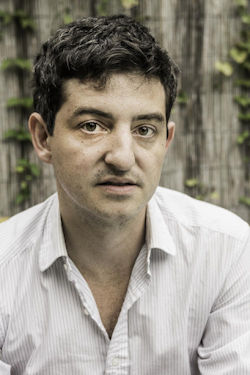SEJournal Online is the digital news magazine of the Society of Environmental Journalists. Learn more about SEJournal Online, including submission, subscription and advertising information.
Inside Story: Climate Narrative Gets to the Personal Behind the Public
Nathaniel Rich’s coverage of missed opportunities to slow climate change, which won first-place honors for outstanding feature story in the Society of Environmental Journalists’ 2019 Annual Awards for Reporting on the Environment, was described by SEJ judges as “strong, gutsy, take-no-prisoners writing [that] backs up this deep dive into early climate change research and a campaign for climate policy led by a small group of scientists, activists and politicians.”
In the piece, which was later expanded into book form, Rich recounts efforts between 1979 and 1989 where the government grasped scientists’ warnings of the catastrophic dangers of failing to rein in human-caused carbon emissions, but failed to act. Judges called the well-researched, yet controversial, narrative “an important contribution to the large body of work on climate change.”
SEJournal Online recently caught up with Rich about the feature. Here is the conversation.
 |
| Photo: Pableaux Johnson. |
SEJournal: How did you get your winning story idea?
Rich: I had grown frustrated with the tropes and clichés that tend to be used in articles about climate change. I wanted to write about the subject in a more honest way. I chose to write about a time, not very long ago, before our current political paralysis had taken hold and before the public conversation had undergone its own form of paralysis. I thought that through an intimate portrait of the lives of the first people to concern themselves with our great existential threat, I might be able to ask questions that are rarely posed in conventional journalism about climate change.
SEJournal: What was the biggest challenge in reporting the piece and how did you solve that challenge?
Rich: The greatest challenge was trying to elicit from my sources the level of granular detail that a successful narrative work requires. Although I wrote about a relatively recent period — 1979-1989 — many of my sources had a very weak recall for scenes that, while hugely significant in retrospect, were not particularly exceptional at the time. I overcame this by simply interviewing more people and spending significantly more time in historical archives than I had anticipated (and I had anticipated doing a lot of that).
SEJournal: What most surprised you about your findings?
Rich: That just about every conversation we are having about climate change today, in 2020, was being held, nearly verbatim, in 1979. The scientists and policy experts debating the subject then had just as much sophistication about even the most arcane questions as those who repeat the conversation today.
‘I believe that narrative literature offers
imaginative possibilities that are usually
closed off to conventional journalism.’
— Nathaniel Rich
SEJournal: How did you decide to tell the story and why?
Rich: It was important to me to sustain, for the length of the story, a close third-person narrative. I believe that narrative literature offers imaginative possibilities that are usually closed off to conventional journalism; it allows for a more personal, intimate grappling with higher questions, particularly those concerning the influence of vast public events on the inner lives of the individuals.
SEJournal: What would you do differently now, if anything, in reporting or telling the story and why?
Rich: The book-length edition of the story, “Losing Earth: A Recent History,” is the fullest expression of what I hoped to accomplish.
SEJournal: What lessons have you learned from your story?
Rich: A critical lesson I've learned from the past forty years of failed efforts to advance climate policy is that patient, rational argument has severe political limitations. It is not enough to give a convincing explanation of what should be done and why. Moral pressure must also be applied. I thought that the best way, as a writer, to grasp the moral dimension of climate crisis was through a narrative account of the lives of those who first encountered this issue in profoundly personal terms.
SEJournal: What practical advice would you give to other reporters pursuing similar projects, including any specific techniques or tools you used and could tell us more about?
Rich: Learn from great work of past generations. While writing “Losing Earth,” I reread John Hersey's “Hiroshima”, Joan Didion's “Miami,” Mark Danner's “The Massacre at El Mozote,” among others.
Nathaniel Rich is the author of “Losing Earth: A Recent History,” which received awards from the Society of Environmental Journalists and the American Institute of Physicists and was a finalist for the PEN/E.O. Wilson Literary Science Writing Award; and the novels “King Zeno” and “Odds Against Tomorrow.” He is a writer-at-large at the New York Times Magazine and a regular contributor to the New York Review of Books. His next book, “Second Nature: Scenes from a World Remade,” will be published in April. Rich lives in New Orleans.
* From the weekly news magazine SEJournal Online, Vol. 5, No. 43. Content from each new issue of SEJournal Online is available to the public via the SEJournal Online main page. Subscribe to the e-newsletter here. And see past issues of the SEJournal archived here.














 Advertisement
Advertisement 



